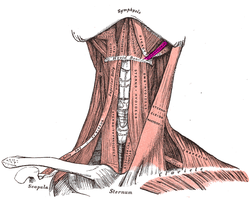The stylohyoid muscle is one of the suprahyoid muscles.[1] Its originates from the styloid process of the temporal bone; it inserts onto hyoid bone. It is innervated by a branch of the facial nerve. It acts draw the hyoid bone upwards and backwards.
| Stylohyoid | |
|---|---|
 The stylohyoid among the triangles of the neck. | |
 Muscles of the neck. Anterior view. Stylohyoid muscle in purple | |
| Details | |
| Origin | Styloid process (temporal) |
| Insertion | Greater cornu of hyoid bone |
| Nerve | Facial nerve (CN VII) |
| Actions | Elevate the hyoid during swallowing |
| Identifiers | |
| Latin | musculus stylohyoideus |
| TA98 | A04.2.03.005 |
| TA2 | 2164 |
| FMA | 9625 |
| Anatomical terms of muscle | |
Structure
editThe stylohyoid is a slender muscle.[2] It is directed inferoanteriorly from its origin towards its insertion.[3]
It is perforated near its insertion by the intermediate tendon of the digastric muscle.[3]
Origin
editThe muscle arises from the posterior surface of the temporal styloid process; it arises near the base of the process. It arises by a small tendon of origin.[3]
Insertion
editThe muscle inserts onto the body of hyoid bone at the junction of the body and greater cornu.[3]
The site of insertion is situated immediately superior to that of the superior belly of omohyoid muscle.[3]
Vasculature
editThe stylohyoid muscle receives arterial supply branches of the facial artery, posterior auricular artery, and occipital artery.[3]
Innervation
editThe stylohyoid muscle receives motor innervation from the stylohyoid branch of facial nerve (CN VII).[3]
Relations
editThe muscle is situated anterosuperior to the posterior belly of the digastric muscle.[2]
Variation
editIt may be absent or doubled. It may be situated medial to the carotid artery. It may insert suprahyoid muscles of infrahyoid muscles.[3]
Actions/movements
editThe stylohyoid muscle elevates and retracts the hyoid bone (i.e. draws it superiorly and posteriorly).[3]
Function
editThis section needs expansion. You can help by adding to it. (January 2018) |
The stylohyoid muscle elongates the floor of the mouth.[3] It initiates a swallowing.[citation needed]
Additional images
edit-
Left temporal bone. Outer surface.
-
Hyoid bone. Anterior surface. Enlarged.
-
Superficial dissection of the right side of the neck, showing the carotid and subclavian arteries.
-
Extrinsic muscles of the tongue. Left side.
-
Stylohyoid muscle
-
Stylohyoid muscle
See also
editReferences
editThis article incorporates text in the public domain from page 392 of the 20th edition of Gray's Anatomy (1918)
- ^ Chokroverty, Sudhansu (2009-01-01), Chokroverty, Sudhansu (ed.), "Chapter 7 - Physiologic Changes in Sleep", Sleep Disorders Medicine (Third Edition), Philadelphia: W.B. Saunders, pp. 80–104, doi:10.1016/b978-0-7506-7584-0.00007-0, ISBN 978-0-7506-7584-0, retrieved 2020-11-11
- ^ a b Rea, Paul (2016-01-01), Rea, Paul (ed.), "Chapter 2 - Head", Essential Clinically Applied Anatomy of the Peripheral Nervous System in the Head and Neck, Academic Press, pp. 21–130, doi:10.1016/b978-0-12-803633-4.00002-8, ISBN 978-0-12-803633-4, retrieved 2020-11-11
- ^ a b c d e f g h i j Standring, Susan (2020). Gray's Anatomy: The Anatomical Basis of Clinical Practice (42nd ed.). New York. p. 581. ISBN 978-0-7020-7707-4. OCLC 1201341621.
{{cite book}}: CS1 maint: location missing publisher (link)
External links
editAnatomy figure: 34:02-04 at Human Anatomy Online, SUNY Downstate Medical Center